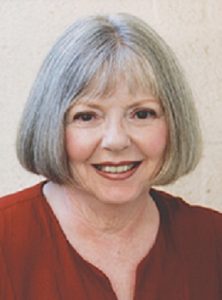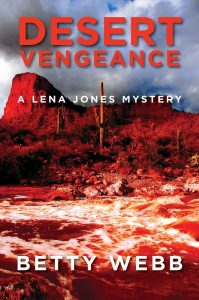As a journalist, Betty Webb has interviewed U.S. presidents, astronauts, and Nobel Prize winners, as well as homeless people, the dying, and polygamy runaways. The Lena Jones mysteries are based on stories she covered as a reporter. She is a member of the National Fe deration of Press Women, Mystery Writers of America, and the National Organization of Zoo Keepers.
deration of Press Women, Mystery Writers of America, and the National Organization of Zoo Keepers.
Desert Vengeance, the 9th Lena Jones mystery, begins with Lena waiting in the parking lot of a prison on the day when “Papa” Brian Wycoff is to be released. Lena has every intention of killing this man who raped her when she was 9 years old while living in the Wycoff home as a foster child.
The next day, Norma Wycoff, the perpetrator’s wife and enabler, is found dead, shot through the eyes. A few days later, Brian Wycoff’s body is found after he was tortured to death. Suspicion first falls on Lena, and then on Wycoff’s other victims, the now-grown men and women he abused when they were children in his care.
Events escalate and lead to a series of twists and turns in the story.
Lena Jones is an intriguing character. Tell us a bit about her.
Lena had a very traumatic childhood. She was found on a Phoenix, Arizona street with a bullet in her head when she was only four years old. From there, she began a journey through foster homes. In one of the homes, she was raped by a man she called Papa Bryan, her fos ter father. That added more trauma onto her pre-existing ones.
ter father. That added more trauma onto her pre-existing ones.
After having been a police officer, she’s now working as a thirty-nine-year-old private detective. Desert Vengeance begins with her showing up at the prison on the day her rapist is scheduled to be released. Lena’s carrying a hunting knife. She’s a haunted woman trying to deal with the hand life has dealt her. Vengeance is on her mind.
Desert Vengeance is the 9th mystery featuring Lena Jones. How has she evolved over the course of time?
At the beginning of the series, in Desert Noir, she would have uncontrollable fits of rage. She began anger management therapy; it was somewhat successful. She also had a terrible fear of closets, which in the third book we learn derives from her foster father having hid in her bedroom closet, before jumping out to attack her.
After a great deal of therapy, she’s improved, but her anguish continues to haunt her.
Desert Vengeance is a classic mystery novel. What are the major elements of a mystery?
First, a crime is committed and we don’t know who did it. Conversely, in a thriller or suspense novel, you may actually see the killer do the crime and might even know his identity.
In a mystery, there’s usually a detective, and that detective is often more important than the crime. I like to see an exploration of the detective’s psyche as well as of everyone’s psyche the killer has harmed. In this novel, the victim is a perpetrator—he’s a serial child molester. I didn’t want to explore his psyche because I don’t really care why a man rapes children. But, I wanted to delve into the psyches of Papa Bryan’s many other victims, not only Lena’s.
I get many emails from former foster care children who assume I am a former foster care child. Fortunately, I’m not. It’s important to me to delve into the psychological impact a crime has had on its victims.
Mystery writers like to drop little clues throughout the novel. If the readers are clever, they often can solve the crime themselves along with the detective. To an extent, mysteries are formulaic. When I was younger, I read Agatha Christie’s mysteries. After reading several of them, I noticed she had a habit of dropping a clue approximately every eleven pages. More than half of those clues were red herrings.
In Desert Vengeance, I was able to drop many clues because a number of Papa Bryan’s victims were still around. As Lena Jones was interviewing them, they would drop what could have been real or false clues.
Do you have a specific method for creating a mystery novel?
Yes. I make a very detailed outline before I write the first word. I denote the length of each chapter; where the chapter takes place; who is involved in each chapter and what will take place. I do that until I have outlined the entire book. But, something happens every time I write another book: by the second or third chapter, I dismiss the outline and go rogue. Desert Vengeance is the only book in the entire series where the killer turned out to be the person I actually planned to be the killer. In my other books, someone else did the deed.
What do you love about writing fiction?
I was a journalist for twenty years. When I wrote a story, I would sometimes think the story was so weird, it couldn’t be made up. One of the things I love about fiction is that it must be believable.
Which writers have influenced you as a novelist?
I like reading J.A. Jance’s novels because she writes about Arizona, too. I love reading books by Peter Robinson. I worship the ground Kate Atkinson walks on. She blends genres; she’s almost a fantasist. She hides everything in a mystery, but when you get into one of her novels, you’re off to magic land. I enjoy reading writers who stretch the genre a bit.
What’s coming next from Betty Webb?
I have another series called the Gunn Zoo series. After retiring from the newspaper business, I returned to one of my early loves—animals. I began volunteering at the Phoenix Zoo. I decided to write mysteries set in a zoo. So, I set an entire series in a zoo. My sleuth is Theodora Bentley, a zookeeper, who lives on a houseboat in Monterey Bay. An animal is featured in each book. The next one is called The Otter of Death.
Congratulations on writing Desert Vengeance, a beautifully-crafted mystery featuring an intriguing protagonist and a book with some of the most unexpected twists in the genre.





Leave a Reply
You must be logged in to post a comment.